
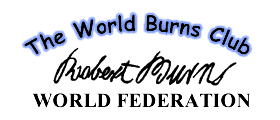
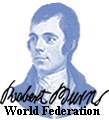
 |
 |
 |
Dalry Burns Club
Origins
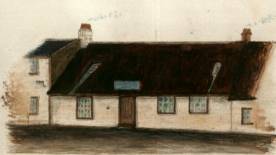 One
evening in December 1825, a group of cronies were gathered in Montgomery's
Inn in Courthill Street (now the 'Turf Inn') in Dalry, Ayrshire, in the south
west of Scotland. Most were weavers: well-read men who could, and did, debate
on almost any subject. On this particular night, however, the talk was of
Robert Burns and several of those present recited his
One
evening in December 1825, a group of cronies were gathered in Montgomery's
Inn in Courthill Street (now the 'Turf Inn') in Dalry, Ayrshire, in the south
west of Scotland. Most were weavers: well-read men who could, and did, debate
on almost any subject. On this particular night, however, the talk was of
Robert Burns and several of those present recited his 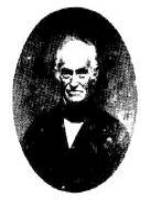 poetry
while others sang some of his songs. During the evening, Hugh Morris, a friend
of "Tannahill" the Paisley poet, suggested that a Burns club be
formed in Dalry. Supported by Andrew Crawford, the proposal proved popular,
with Crawford and Morris being elected secretary and president respectively.
The innkeeper John Montgomery happily agreed to host the first supper in his
inn on the 25th January 1826. Thus began a tradition which has spanned the
intervening years without a break: on 25th January, 2002, Dalry Burns Club
will hold its 177th consecutive Anniversary Supper. While other clubs may
have been formed earlier, none can equal this proud record.
poetry
while others sang some of his songs. During the evening, Hugh Morris, a friend
of "Tannahill" the Paisley poet, suggested that a Burns club be
formed in Dalry. Supported by Andrew Crawford, the proposal proved popular,
with Crawford and Morris being elected secretary and president respectively.
The innkeeper John Montgomery happily agreed to host the first supper in his
inn on the 25th January 1826. Thus began a tradition which has spanned the
intervening years without a break: on 25th January, 2002, Dalry Burns Club
will hold its 177th consecutive Anniversary Supper. While other clubs may
have been formed earlier, none can equal this proud record.
The Cairn
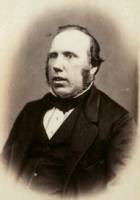 The
records of the Club are known as the Cairn. That the Club has such a comprehensive
history of its membership and anniversary suppers is due to William Logan
of Coldstream, Kilbirnie, the first compiler of the Club's records. He was
elected to membership in1853, became President in 1864 and his last contribution
was in 1866. These early records are intriguing not only for the details of
the toasts and songs heard at the early suppers but also because of the biographical
detail given for the members. This information is available on the Club's
website archive at www.dalryburnsclub.org. The Club is also greatly indebted
to subsequent secretaries who have conscientiously maintained the Cairn until
the present day. The books and artifacts comprising the Cairn are now on display
in the Public Library, Dalry.
The
records of the Club are known as the Cairn. That the Club has such a comprehensive
history of its membership and anniversary suppers is due to William Logan
of Coldstream, Kilbirnie, the first compiler of the Club's records. He was
elected to membership in1853, became President in 1864 and his last contribution
was in 1866. These early records are intriguing not only for the details of
the toasts and songs heard at the early suppers but also because of the biographical
detail given for the members. This information is available on the Club's
website archive at www.dalryburnsclub.org. The Club is also greatly indebted
to subsequent secretaries who have conscientiously maintained the Cairn until
the present day. The books and artifacts comprising the Cairn are now on display
in the Public Library, Dalry.
The Tappit Hen
In 1888, John Paton, "mine host" of the Turf Inn until 1887, made
a gift to the Club of several items habitually used by the Club, including
the Tappit Hen. In the early years, the receipt for payment of a member's
annual subscription was a drink from the Tappit Hen and today a glass of whisky
is dispensed to members on payment of their dues.
The Supper
Although the form and content of the annual anniversary supper have evolved
over the years, there are several distinctive features worthy of note. In
addition to the toast The Memory of Burns, the toast list includes a second
major toast, The Memory of Jean Armour, giving due recognition to that remarkable
woman's place in the life of the poet. Further, all toasts, recitations and
musical contributions are given by Club members; no guest speakers or performers
are engaged.
The Club's Golden Jubilee Supper in 1875 was held under the chairmanship of David Brown, a printer and publisher who produced a facsimile of The Kilmarnock Edition in 1908. Two founding members, James Kenyon and James McNair, were present at this supper. Also present was the Kilmarnock publisher James McKie, whose magnum opus was a copy of the same edition using type from the original matrices, specially made paper and the original printing press. McKie was the prime mover behind the campaign for the erection of a monument to Burns in Kilmarnock.
Until the Centenary Supper in 1925, only two songs, God Save the King and Auld Lang Syne were sung by the entire company but thereafter There Was A Lad, Land O' The Leal, O' A' The Airts and Scots Wha Ha'e were added as community songs. In 1937, the venue for the supper was changed to the larger dining room within the King's Arms Hotel and this allowed an increase in membership numbers. Prior to 1946, when the Club Constitution was drawn up, only a few unwritten rules existed and these were liberally interpreted. One such rule allowed a guest at a supper to join the Club during the following year and it became necessary to impose a limit on membership. The limit was set at seventy, subsequently increased to ninety in 1968, with the Public Hall becoming the venue for the anniversary suppers. In recent years, the Club has held its annual celebration in Dalry Community Centre.
Distinguished Members
The Club's membership has included a number of distinguished members, including
James Dunlop (b 1793), the son of a Dalry weaver, who pursued an interest
in astronomy. He was elected a Fellow of the Royal Society and became Astronomer
Royal of New South Wales. John Kerr, a founding member, was a teacher in Dalry
at the age of fifteen and became Chief Inspector of Schools for Scotland.
John Blair, another weaver's son, was a Writer to the Signet and the acknowledged
expert in bankruptcy law in Scotland, as much at home in the House of Lords
as in his Edinburgh office. He presented Dalry with its Public Park in 1893.
George Houston was born in Dalry in 1869 and chaired the Club in 1908; he
achieved international fame as an artist and was elected R S A in 1925. Allan
Wilson Boyle was chairman in 1938 and was elected president of the Burns Federation
for 1954/55; he presided at an international Burns supper held in Ayr which
had the distinction of being the first televised event of its kind.
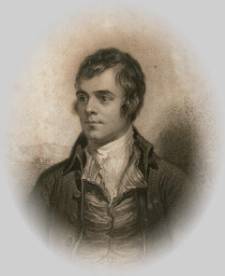
Dalry Burns Club takes great pride in its history and traditions and it looks
to its younger members, and to the continued sponsorship of Burns competitions
in local schools, to maintain and carry forward these traditions into the
new century. It is our intention to ensure that the memory of Scotland's national
poet remains vivid both locally and worldwide, and that his poems and songs
remain appreciated and enjoyed for many years to come.
The Club's website (www.dalryburnsclub.org)
contains a full archive of the Club's anniversary suppers, together with photo
galleries, historical information, a chronology and links to other useful
Burns sites.